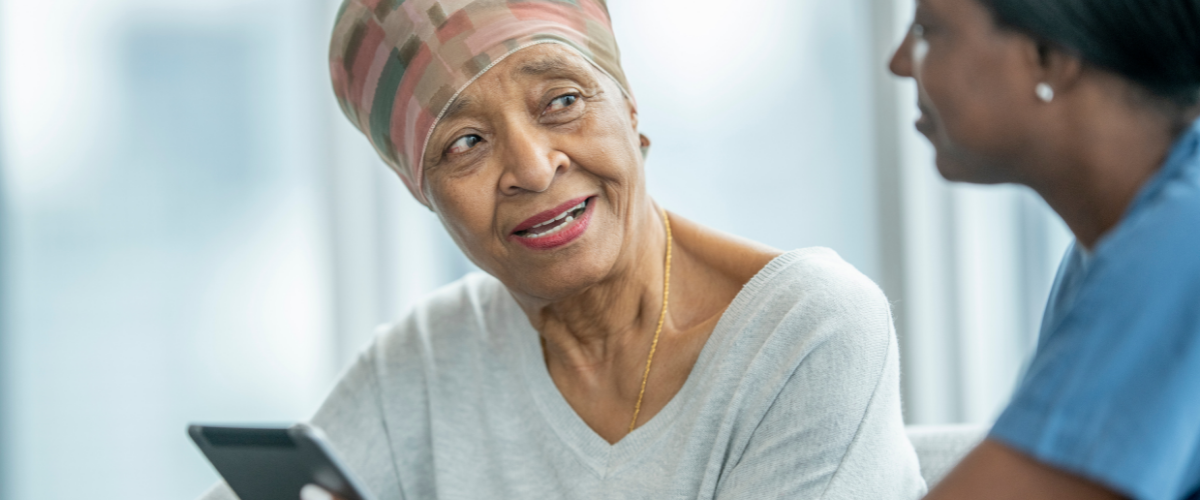Cancer is prevalent among Canadian seniors with breast, lung, colorectal and prostate cancers reported as the most frequent. It is one of the leading causes of death among Canadian seniors.
Cancer is an illness that can take a heavy toll on the afflicted. Both the disease and the treatment can leave the patient vulnerable to many other health problems, cause weakness and limit mobility. The stress of the disease can also cause irritability. All of this can make the live-in caregiver jobs challenging especially for those caring for a cancer patient.
A cancer patient may need full-time care. Apart from help on the medical and treatment fronts, often in the form of keeping up with the medicine and facilitating the communication between patients and doctors, the caregivers for seniors also need to provide emotional support.
In Canada, cancer patients receive their treatments as outpatients so they are not checked into hospitals or cancer-assisted living facilities. So, most need home care either from family members, volunteers or professional caregivers.
What does Caring for a Cancer Patient Involve?
Home caregivers have several responsibilities when caring for seniors afflicted with Cancer. Some of them are listed below:
1. Grooming
Cancer patients are often tired, lethargic and unmotivated, and cannot care for themselves. Thus it can fall on the caregiver to help them with grooming. It is said that if you look good you feel good, so grooming and hygiene can make a care plan more effective.
For female patients, helping them with styling hair, and putting on makeup and for those facing hair loss, making sure that they have their favourite wig or cap in place can be immensely helpful.
For male patients, shaving and trimming their hair and beards can boost their mood and help them feel good about themselves.
Electric trimmers and non-alcoholic and hypoallergenic creams, soaps and makeup must be used for grooming. Doctors can provide detailed guidance on what is safe and not safe while grooming as different cancer patients may need different forms of care.
Seniors going through chemotherapy may also need help with brushing their teeth regularly. Otherwise, they are prone to catching oral infections. Live-in Caregiver Toronto must make sure that they are using soft bristle brushes and kinds of toothpaste that do not contain any strong chemicals such as whitening agents. The oncologist or family doctor can also recommend suitable mouthwash.
2. Bathing
The cancer patients’ skin is extremely sensitive so keep the water temperature low and comfortable. Skin issues are common side effects of chemotherapy. Patients must be patted dry after bathing. The skin must be kept moisturized. The live-in caregiver must ensure that a water-based skin moisturizer is being used.
For cancer patients with hair loss, use a natural and organic shampoo. Use a soft bristle brush for hair brushing as it will not be harsh on the skin.
3. Diet
Chemotherapy kills hunger.
When a senior with a loss of hunger does have an appetite, the caregiver must prepare a large healthy meal of the senior’s favourite dishes.
Another approach may be to provide several tiny, easily palatable meals throughout the day so that the senior can still get vital nutrients.
Some cancer patients may be able to tolerate popsicles, protein shakes or their preferred flavours of milkshakes. The caregiver can try to incorporate these into the daily meal plan.
In addition, water, clear soups, caffeine-less weak tea and sports drinks are a good way to provide energy and hydration on days that the client will not eat.
Lastly, leaving some light and nutritious snacks on their side can be effective as they can reach out easily whenever they feel like eating.
4. Clothing
Cancer treatment causes weight loss due to loss of appetite and weakness. Seniors undergoing cancer treatment lose muscle mass and their existing wardrobe may not fit anymore. The caregiver can pick up some better-fitting clothes that are soft on the clients’ skin. Or they can help get some of their clients’ favourite clothes altered at a neighbourhood tailor so they fit better.
5. Relaxing
Destressing is essential for Cancer patients as the affliction and the treatment can last a long time.
Exercising can help. For clients who can walk, the caregiver can motivate them and accompany them for a daily walk which can improve their mood. For clients who are bedbound, the caregiver can ensure that they are exercising daily to stay active and flexible. The patients’ doctors must be consulted before starting any exercise regime.
Deep breathing exercises, if done properly, are another way to reduce stress and anxiety.
Listening to music, socializing with friends and family, or joining a support group can also help cancer patients manage anxiety and the caregiver can facilitate that.
Conclusion
Cancer is prevalent among Canadian seniors and requires complex care from knowledgeable caregivers. Senior home care in Mississauga must educate themselves about tips for caring for a cancer patient and make sure that they are helping their clients manage the physical and mental toll of both the disease and medication.
You can find more details on Cancer and Cancer care in our Caring for Cancer brochure.
Want to Learn More?
Please reach out to us at wecare@considracare.com, or call us at 1-855-410-7971, and we will be happy to understand and help you with the care needs of a loved one.

